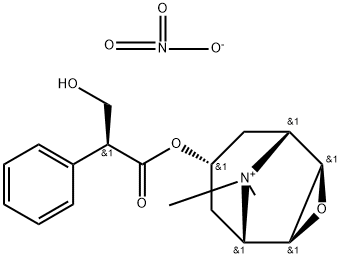Manufacturing Process
In a one-liter separatory funnel, 94 g (0.215 mol) of scopolamine hydrobromide trihydrate was dissolved in 250 ml of water, made alkaline by shaking with 40 g (1 mol) of sodium hydroxide in 150 ml of water, and the free base immediately extracted with ether. As scopolamine is somewhat soluble in water, the aqueous layer was saturated with potassium carbonate and again extracted with ether. The combined ether extracts were dried over anhydrous magnesium sulfate and the ether removed by distillation, leaving 65 g (0.214 mol; 100% yield) of nearly colorless oil. Then 100 g (1.05 mol) of cold methyl bromide was added to a chilled, 500-ml pressure flask containing
the 65 g of scopolamine, the flask stoppered tightly with a clamp, and allowed
to stand at room temperature for 96 hours. The flask was cooled before
opening, excess methyl bromide removed by distilling, and the white solid
washed thoroughly with dry ether. The yield of crude Nmethylscopolammonium bromide was 80 g (94 %t yield). The salt was
recrystallized from 550 ml of alcohol; first crop, 70 g, MP: 212-214°C; second
crop, 6 g, melting point 195-200°C. The combined crops were again
recrystallized from 500 ml of alcohol; melting point 210-212°C. The third
recrystallization from 600 ml of alcohol yielded 64 g, melting point 214-
216°C, a 75 % yield based on scopolamine hydro-bromide trihydrate starting
material. N-Methylscopolammonium bromide may be dissolved in water. An
equivalent of solution AgNO3 was added, a precipitated AgBr was filtered off.
The filtrate was evaporated to dryness to give the desired Nmethylscopolammonium nitrate.
World Health Organization (WHO)
Hyoscine methonitrate, a quaternary ammonium anticholinergic
agent, was introduced in 1947 for use as a gastrointestinal antispasmodic. The
action taken in Sweden relates to the use of this compound in preparations for
suppressing the appetite. Preparations may remain available elsewhere.
